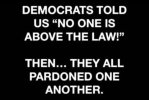You are using an out of date browser. It may not display this or other websites correctly.
You should upgrade or use an alternative browser.
You should upgrade or use an alternative browser.
Are we now officially in a dictatorship?
- Thread starter str8line
- Start date
PJF
Well-Known Member
∆PJF in particular brings nothing to the table that a bot wouldn't. Has no insight. No original opinions. No unique perspective. In fact they do not provide any personal information or context in regard to how they came to their opinion.
Mongoose is different in that they are just generally oppositional. You could go out of your way to try to agree with Mongoose and they would still tell you why you didn't get it and why you were wrong. I think this general approach to life has led them to MAGA where such personality disorders have coalesced and found common comfort. That has driven them to take on the extreme views of the movement when before they were just generally skeptical and intentionally contradictory.

They are both just groupies hoping to get a taste of Trump's ejaculatePJF in particular brings nothing to the table that a bot wouldn't. Has no insight. No original opinions. No unique perspective. In fact they do not provide any personal information or context in regard to how they came to their opinion.
Mongoose is different in that they are just generally oppositional. You could go out of your way to try to agree with Mongoose and they would still tell you why you didn't get it and why you were wrong. I think this general approach to life has led them to MAGA where such personality disorders have coalesced and found common comfort. That has driven them to take on the extreme views of the movement when before they were just generally skeptical and intentionally contradictory.
PJF
Well-Known Member
Sardines
Well-Known Member
Absolutely! Unfortunately the government failed to protect me adequately from reckless idiots and more than ONE MILLION Americans died as a result.Where were you during Covid? Did you speak up then?
fishonjazz
Well-Known Member
Contributor
2018 Award Winner
2019 Award Winner
20-21 Award Winner
2022 Award Winner
2023 Award Winner
2024 Award Winner
2025 Award Winner
But it's the exact same bro! trump is trying to suppress free speech in order to save millions of lives too!Absolutely! Unfortunately the government failed to protect me adequately from reckless idiots and more than ONE MILLION Americans died as a result.
Sardines
Well-Known Member
I should point out that most of the ONE MILLION dead Americans were fat, old or both, so not only is it just fine, it might have just been a good thing... amiright?Absolutely! Unfortunately the government failed to protect me adequately from reckless idiots and more than ONE MILLION Americans died as a result.
/s
fishonjazz
Well-Known Member
Contributor
2018 Award Winner
2019 Award Winner
20-21 Award Winner
2022 Award Winner
2023 Award Winner
2024 Award Winner
2025 Award Winner
Hopefully a lot of the dead were homeless people. 2 birds 1 stone!I should point out that most of the ONE MILLION dead Americans were fat, old or both, so not only is it just fine, it might have just been a good thing... amiright?
/s
Sent from my OPD2203 using Tapatalk
Bucknutz
Well-Known Member
Show me where you stood up for speech.Absolutely! Unfortunately the government failed to protect me adequately from reckless idiots and more than ONE MILLION Americans died as a result.
What a garbage response… please explain to me how the government failed to protect you adequately, when you’re still here posting non sense. There are 340 million people in America and it had less than a 1% death rate… failure, good god. That includes 2 presidents.
You want to shut down speech because you wanted to control 340 million people and tell them there is no natural immunity, that if you get the vaccine you can’t spread covid or that it didn’t start in Wuhan. If you said these things social media could and would boot you.
17 million people kill more Americans a year than Covid ever did…guess what the government controls them and death still happens. Yet you’re fine with letting the medical field keep doing there thing, keep there voices and keep killing up to 400k people a year with malpractice.
Why can’t our government be like other governments such as the UK with only 1.7 million medical professionals and will control them by only killing up to 11k a year. That’s 75% less than our government allows. Germany controls up to 18k deaths a year with medical malpractice, that’s 82% less than us.
But you want our government to control a disease and shut off the voices of Americans because you didn’t like what they said. You think shutting off voices would have changed things?
Weird California had the longest, strictest COVID policies and had the most deaths. Florida who has the second highest (65+) elderly population % and total, with the loosest COVID policies had less deaths.
I will never back down from my position on Free speech. If you show me where Trumps government said to get rid of Jimmy or shut down someone’s speech on social media, I’ll join you in bashing him and the government.
Red
Well-Known Member
I posed to AI: “the social contract requires citizens to adopt a “one for all, all for one” approach during a dangerous pandemic”. Which I thought should be the case, but I was mistaken, according to this AI overview. I would suggest the extreme polarization in the United States will naturally erode the belief in obligations of individuals toward the collective whole. I would also strongly suggest that the upsurge in conspiracism, the tendency of some citizens to immediately suspect ulterior motives whenever virtually any important issue that arises in the United States, clearly does not help. It’s my belief that there is a great upsurge in irrational thinking in the modern era, and it’s nowhere more evident than in our nation. I don’t think any of this helps, when a rational, science based response to pandemics would be far better. That is not possible in the United States, at this time in our history. Therefore, even the very existence of the concept of a “social contract” is largely unknown to our citizens. And does not even arise in these arguments over the Covid pandemic. What social contract? Everything begins and ends with me. Screw everyone else.Show me where you stood up for speech.
What a garbage response… please explain to me how the government failed to protect you adequately, when you’re still here posting non sense. There are 340 million people in America and it had less than a 1% death rate… failure, good god. That includes 2 presidents.
You want to shut down speech because you wanted to control 340 million people and tell them there is no natural immunity, that if you get the vaccine you can’t spread covid or that it didn’t start in Wuhan. If you said these things social media could and would boot you.
17 million people kill more Americans a year than Covid ever did…guess what the government controls them and death still happens. Yet you’re fine with letting the medical field keep doing there thing, keep there voices and keep killing up to 400k people a year with malpractice.
Why can’t our government be like other governments such as the UK with only 1.7 million medical professionals and will control them by only killing up to 11k a year. That’s 75% less than our government allows. Germany controls up to 18k deaths a year with medical malpractice, that’s 82% less than us.
But you want our government to control a disease and shut off the voices of Americans because you didn’t like what they said. You think shutting off voices would have changed things?
Weird California had the longest, strictest COVID policies and had the most deaths. Florida who has the second highest (65+) elderly population % and total, with the loosest COVID policies had less deaths.
I will never back down from my position on Free speech. If you show me where Trumps government said to get rid of Jimmy or shut down someone’s speech on social media, I’ll join you in bashing him and the government.
AI Overview:
No, the social contract does not explicitly require citizens to adopt a strict "one for all, all for one" approach during a pandemic, though social cooperation is essential
. Instead, classical social contract theory provides a framework for understanding the tension between individual liberties and the need for collective safety during a public health crisis. Different interpretations of the social contract can justify various public health measures, from mandates to appeals for voluntary action.
Key social contract interpretations during a pandemic
The obligation of citizens during a pandemic can be viewed through the lens of various social contract theorists:
Thomas Hobbes and collective security
- The theory: Hobbes's philosophy is rooted in the fear of the "state of nature," which he described as "solitary, poor, nasty, brutish, and short". To escape this, individuals willingly surrender some of their freedoms to an absolute sovereign in exchange for security and order.
- Pandemic application: A Hobbesian view would support the state's right to impose strict, mandatory public health measures, such as lockdowns, quarantines, and vaccine mandates. The sovereign's primary responsibility is to preserve life, and in a pandemic, this includes the lives of all citizens. The "one for all" could be interpreted as absolute compliance with state orders for the sake of collective survival.
- The theory:Rousseau believed that citizens enter into a social contract to follow the "general will," which represents the common good, not just the sum of individual interests. In times of extreme crisis, he even suggested a temporary dictatorship might be necessary to ensure the state's survival.
- Pandemic application: A Rousseau-inspired approach would emphasize social cooperation and solidarity. Individuals would be called upon to act for the collective good—wearing a mask, isolating, or getting vaccinated—because it is in their own long-term interest. The "all for one" part of the motto would resonate strongly here, focusing on shared responsibility to combat a threat to the community.
John Locke and individual rights
- The theory: Locke argued that the social contract's purpose is to protect an individual's natural rights to life, liberty, and property. Unlike Hobbes, Locke saw the government's power as limited, accountable to the people, and potentially illegitimate if it oversteps its bounds.
- Pandemic application: A Lockean perspective would prioritize individual liberty. While recognizing the need for collective safety, it would be more cautious about public health mandates and more protective of personal freedoms. This view emphasizes a careful balancing act between individual autonomy and societal well-being. Individuals could argue against certain mandates if they are perceived as an overreach of government power.
The differences in these social contract interpretations create a natural tension in modern democratic societies, which often borrow from multiple traditions:
- The tension between individual and collective good: A dangerous pandemic creates a conflict between individual desires and collective needs. For example, a person may want to refuse a vaccine, but their choice could impact herd immunity and the safety of the community.
- Mandates vs. voluntary action: Governments often rely on a combination of mandates (e.g., vaccine requirements) and appeals to social solidarity during a public health crisis. The extent to which a population accepts these measures depends on how the unwritten social contract is interpreted in that society.
- International cooperation: The COVID-19 pandemic also exposed the limits of a social contract focused solely on the nation-state, highlighting the need for a global social contract to ensure fair access to public health goods, such as vaccines.
The Social Contract (Easy 3 Minute Explanation) - YouTube
Jan 21, 2025 — In this hypothetical state of nature, people have complete freedom but lack security and order. By consenting to a social contract, individuals trade some of th...
YouTube
ETHICS BETWEEN INDIVIDUAL RIGHTS AND SOCIAL RESPONSIBILITIES - PMC
Apr 13, 2023 — Although we take great pride in our individual freedoms in the United States and other modern democracies, we oftentimes forget that no right is absolute. This ...
National Institutes of Health (NIH) | (.gov)
The Social Contract Theories of Thomas Hobbes and John Locke
Jul 1, 2021 — Orientation and Analysis. Thomas Hobbes and John Locke are both modern philosophers who advocate the Social Contract Theory. Thomas Hobbes, a socio-political th...
rksmvv.ac.in
social contract revisited | European Journal of Public Health | Oxford Academic
Oct 5, 2015 — From the earliest days, philosophers have debated the relationship between the individual and the state. Thomas Hobbes argued that individuals must concede some...
Oxford Academic
Last edited:



